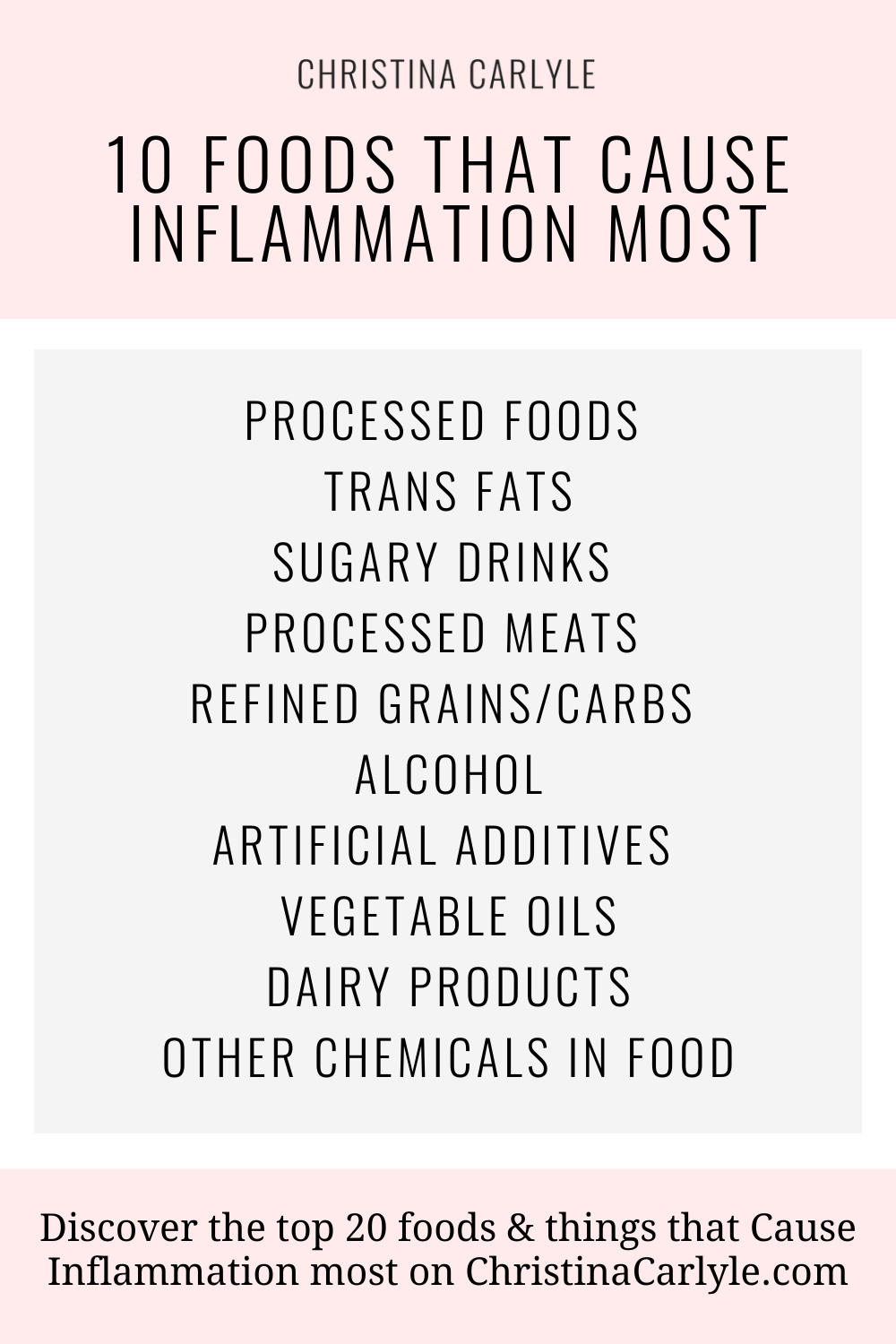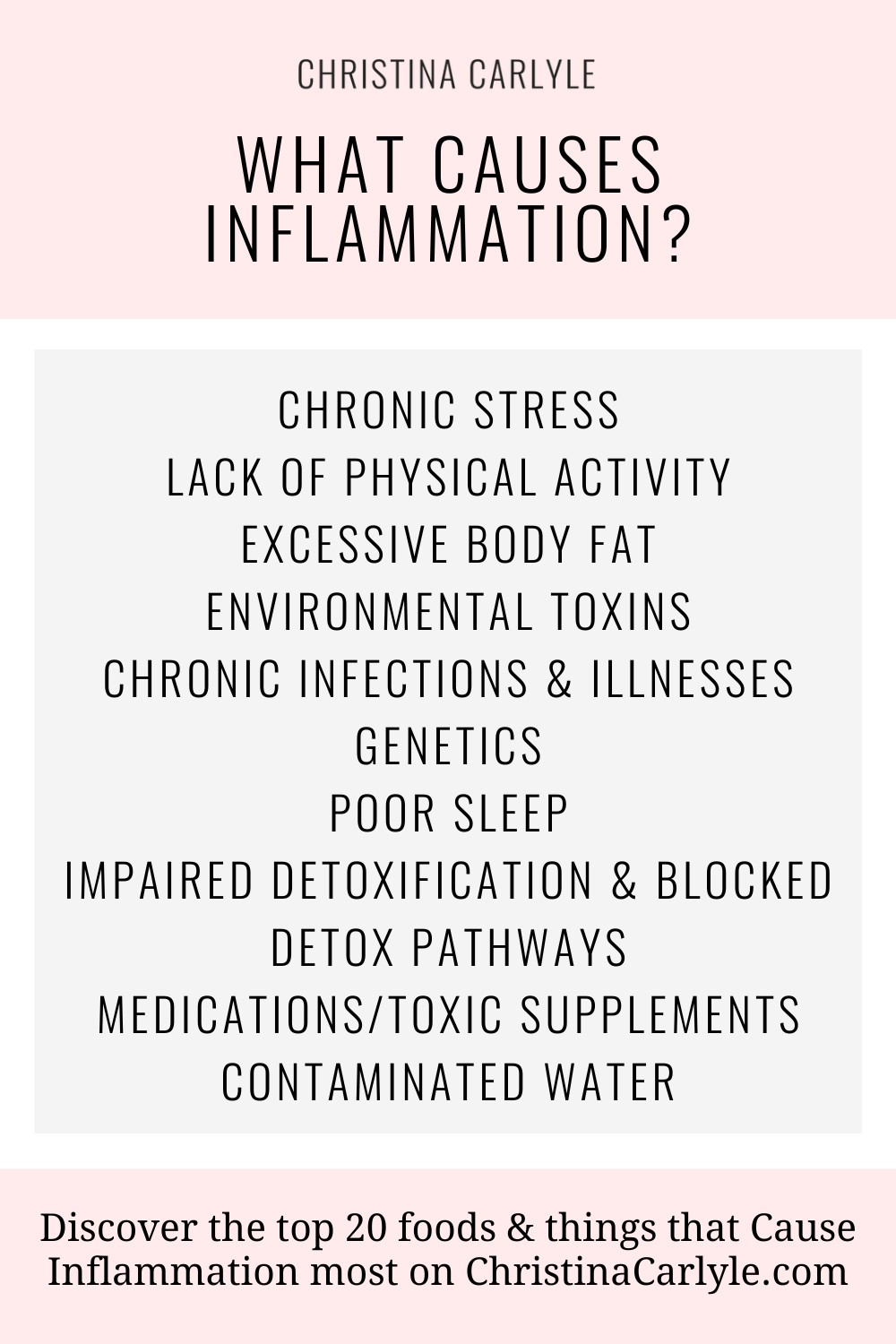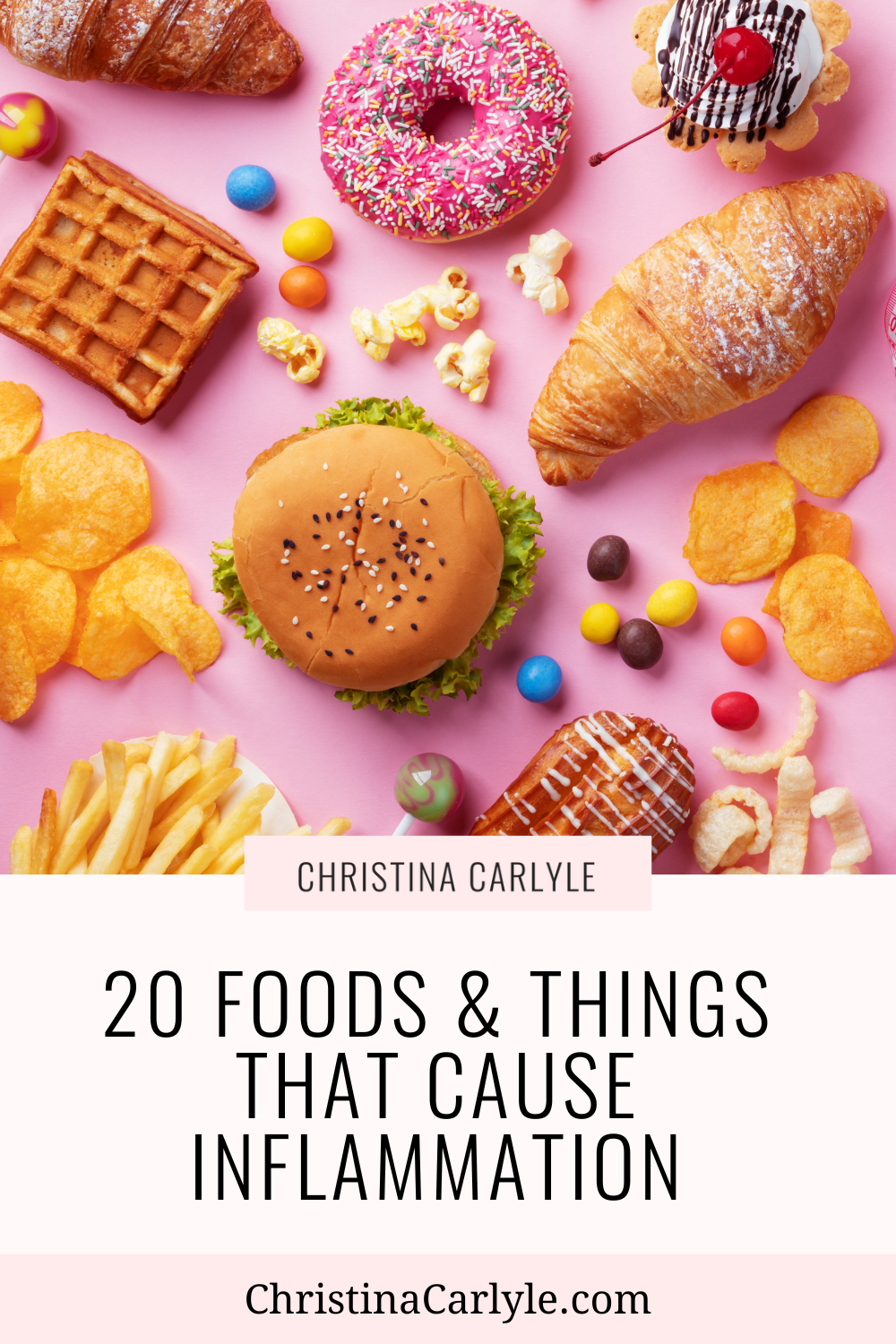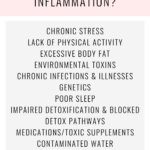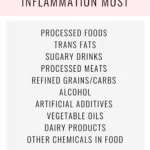Last Updated on April 9, 2024
Wondering what foods cause inflammation? You’re in the right place. Inflammatory foods are among the worst foods you can consume.
First, I’ll discuss what inflammation is and how inflammatory foods damage the body. Then I’ll share the top 10 foods (and things in food) that cause inflammation the most. I’ll also share a list of other common inedible sources of inflammation because I know a lot of people still have inflammation even though they’re eating healthy.
Let’s dig in.
How Inflammatory Foods Damage the Body
Inflammation is a natural and necessary process that helps the body fight off infections, heal injuries, and repair damaged tissues. It’s the body’s way of protecting itself and initiating the healing process. When tissue is damaged or threatened by harmful stimuli the immune system responds by triggering inflammation to eliminate the threat and repair the damaged tissue.
However, chronic or excessive inflammation can have negative effects on both physical and mental health, as well as weight management. When you eat inflammatory foods or experience other causes of inflammation they can start to affect your health in so many detrimental ways because they literally damage tissues in the body. Here are the most common ways that inflammation & inflammatory foods damage the body affecting health and metabolism in the process.
Physical Health:
- Chronic Diseases: Prolonged inflammation is associated with the development and progression of various chronic diseases, including cardiovascular disease, diabetes, autoimmune disorders, neurodegenerative diseases, and certain types of cancer.
- Immune Dysfunction: Chronic inflammation can dysregulate the immune system, leading to increased susceptibility to infections and impaired immune function.
- Tissue Damage: Inflammatory processes can cause damage to healthy tissues and organs over time, contributing to tissue degeneration and dysfunction. Premature aging is also common with chronic inflammation.
- Pain and Discomfort: Inflammatory conditions such as arthritis and inflammatory bowel disease can cause persistent pain, discomfort, and reduced mobility.
Mental Health:
- Neuroinflammation: Inflammation in the brain, known as neuroinflammation, has been implicated in the pathophysiology of various mental health disorders, including depression, anxiety, schizophrenia, and cognitive decline.
- Neurotransmitter Imbalance: Inflammatory cytokines can disrupt neurotransmitter balance and function in the brain, affecting mood, cognition, and behavior.
- Stress Response: Chronic inflammation can activate the body’s stress response system, leading to increased production of stress hormones like cortisol, which can further exacerbate inflammation and contribute to mental health problems.
Weight Management:
- Metabolic Dysfunction: Inflammation is closely linked to metabolic dysfunction, insulin resistance, and obesity. Chronic low-grade inflammation can interfere with hormone-signaling pathways involved in appetite regulation, energy balance, and metabolism.
- Fat Accumulation: Inflammatory cytokines can promote the accumulation of visceral fat, which is associated with an increased risk of metabolic syndrome, type 2 diabetes, and cardiovascular disease.
- Leptin Resistance: Inflammation can impair the function of leptin, a hormone that helps regulate appetite and energy expenditure. Leptin resistance can disrupt satiety signals, leading to overeating and weight gain.
One of the easiest ways to reduce inflammation in the body is to avoid consuming inflammatory foods. This is especially true if you’re already experiencing the health and weight issues mentioned above.
TOP 10 FOODS THAT CAUSE INFLAMMATION
Processed Foods: Foods high in sugar, refined carbohydrates, and unhealthy fats, such as those found in fast food, processed snacks, and sugary beverages, can promote inflammation. The combination of refined sugars/carbs and unhealthy fats is the most inflammatory combination of nutrients possible. Refined sugars can lead to spikes in blood sugar levels, triggering an inflammatory response in the body. Unhealthy fats, such as trans fats and saturated fats, found in processed foods like fast food and snacks, can increase inflammation and raise the risk of chronic diseases like heart disease.
Trans Fats: Trans fats are found in many processed and fried foods, such as margarine, shortening, and commercially baked goods. They can increase inflammation and raise the risk of heart disease. Trans fats have been shown to promote inflammation by increasing levels of pro-inflammatory cytokines and oxidative stress in the body. They can also raise levels of “bad” LDL cholesterol and lower levels of “good” HDL cholesterol, increasing the risk of heart disease and other inflammatory conditions.
Sugary Drinks: Beverages high in added sugars, such as soda, energy drinks, and sweetened fruit juices, can contribute to inflammation and other health issues when consumed in excess. The high sugar content in these drinks can lead to spikes in blood sugar levels and insulin resistance, promoting inflammation and increasing the risk of chronic diseases like type 2 diabetes and obesity. Additionally, sugary drinks often lack essential nutrients and may displace healthier beverage choices, further contributing to inflammation and poor health outcomes.
Processed Meats: High intake of certain meats and processed meats like bacon, sausage, and deli meats has been linked to inflammation and an increased risk of chronic diseases like heart disease and cancer. Processed meats contain harmful additives like nitrates and nitrites, which can promote inflammation and oxidative stress in the body. Additionally, the high levels of saturated fats and advanced glycation end products (AGEs) found in red and processed meats can contribute to inflammation and insulin resistance, increasing the risk of metabolic disorders and inflammatory conditions.
Refined Grains/Carbs: Foods made with refined grains, such as white bread, white rice, and pasta, can spike blood sugar levels and promote inflammation when consumed regularly. Refined carbohydrates have a high glycemic index, meaning they cause rapid increases in blood sugar and insulin levels, leading to inflammation and insulin resistance over time. Additionally, refined grains lack essential nutrients like fiber, vitamins, and minerals, further contributing to inflammation and poor health outcomes.
Alcohol: Excessive alcohol consumption can lead to inflammation in the body, particularly in the liver. Alcohol is metabolized by the liver, where it can generate reactive oxygen species (ROS) and induce oxidative stress, leading to tissue damage and inflammation. Chronic alcohol abuse is associated with liver inflammation (alcoholic hepatitis), gastrointestinal inflammation, and systemic inflammation, increasing the risk of liver disease, digestive disorders, and other inflammatory conditions.
Artificial Additives: Some additives found in processed foods, such as artificial sweeteners, preservatives, and colorings, can cause inflammation. Many of these artificial additives are created by chemicals that are perceived as harmful by the immune system, triggering an inflammatory response as the body attempts to defend itself. Artificial sweeteners, preservatives, and colorings found in processed foods can trigger inflammation by disrupting immune function and promoting oxidative stress, too.
Vegetable Oils: Certain vegetable oils, such as soybean oil, corn oil, and sunflower oil, are high in omega-6 fatty acids, which can promote inflammation when consumed in excess. These oils are commonly used in processed and fried foods, contributing to the high intake of omega-6 fatty acids in the Western diet. While omega-6 fatty acids are essential for health, an imbalance between omega-6 and omega-3 fatty acids can promote inflammation and increase the risk of chronic diseases like heart disease, diabetes, and obesity. If you’re confused about what oils are healthy – or not – check out my ultimate guide to Healthy Cooking Oils.
Dairy Products: Dairy inherently isn’t inflammatory. The relationship between dairy consumption and inflammation is complex and can vary from person to person. BUT some people may experience inflammation or digestive issues from consuming dairy products, particularly those with lactose intolerance or sensitivity to dairy proteins like casein. Lactose intolerance, a condition characterized by the inability to digest lactose (the sugar found in milk), can lead to gastrointestinal symptoms like bloating, gas, and diarrhea, which may trigger inflammation in the gut. Additionally, some individuals may have an immune reaction to dairy proteins like casein, leading to inflammation and other adverse reactions. If you already have GI inflammation, then you can become sensitive to dairy, which is why those with GI issues are typically asked to avoid it.
Other Chemicals: Pesticides and fertilizers, commonly used in conventional agriculture to enhance crop yields and protect against pests and diseases, can contribute to inflammation in several ways. Some pesticides have been shown to disrupt normal physiological processes in the body, such as hormone regulation and immune function, which can trigger inflammatory responses. Additionally, certain pesticides are known to induce oxidative stress by generating reactive oxygen species (ROS) within cells, which can damage cellular structures and promote inflammation. Exposure to pesticides and fertilizers can disrupt the balance of gut microbiota, leading to dysbiosis and increased intestinal permeability, allowing toxins and inflammatory molecules to enter the bloodstream and provoke systemic inflammation.
TOP 10 ROOT CAUSES OF INFLAMMATION
In addition to dietary factors, several other things can contribute to inflammation in the body. I wanted to include these because a lot of people still have inflammation even though they’re eating healthy foods and drinks. If you’ve cleaned up your diet and still have inflammation, the reason is most likely on this list:
Chronic Stress: Prolonged stress activates the body’s stress response system, leading to the release of stress hormones like cortisol. While cortisol is essential for short-term stress responses, chronic elevation of cortisol levels can dysregulate the immune system and promote inflammation. Chronic stress has been linked to various inflammatory conditions and diseases, including cardiovascular disease, autoimmune disorders, and depression.
Lack of Physical Activity: Sedentary behavior and lack of exercise are associated with increased levels of inflammatory markers in the body. Regular physical activity helps reduce inflammation by modulating the production of cytokines and other inflammatory molecules, improving circulation, and enhancing immune function. Exercise also promotes the release of anti-inflammatory substances and stimulates the production of endorphins, which can help alleviate inflammation and improve overall health.
Excess Body Fat: Excess body fat, especially visceral fat surrounding abdominal organs, secretes pro-inflammatory chemicals called cytokines, such as tumor necrosis factor-alpha (TNF-alpha) and interleukin-6 (IL-6). These cytokines contribute to a chronic low-grade inflammatory state in the body, disrupting normal metabolic processes and increasing the risk of insulin resistance, cardiovascular disease, and other inflammatory conditions.
Environmental Toxins: Exposure to environmental toxins, such as air pollution, cigarette smoke, pesticides, heavy metals, and industrial chemicals (commonly found in breast implants), can trigger inflammation by activating immune responses and generating oxidative stress. These toxins can directly damage cells and tissues, disrupt immune function, and contribute to the development of inflammatory diseases, including respiratory inflammation, neuroinflammation, and cancer.
Chronic Infections & Illnesses: Persistent infections caused by bacteria, viruses, or other pathogens like candida, mold, and parasites can lead to chronic inflammation as the immune system continues to respond to the ongoing threat. Chronic infections can activate immune cells and stimulate the release of inflammatory cytokines, contributing to tissue damage and inflammation in affected organs. Many chronic diseases, such as autoimmune disorders, diabetes, cardiovascular disease, and inflammatory bowel disease, involve inflammation as a key component of their pathology.
Genetics: Genetic factors can influence an individual’s susceptibility to inflammation and inflammatory diseases. Certain genetic variations may affect immune responses, cytokine production, and other inflammatory pathways, increasing the risk of developing chronic inflammatory conditions. However, genetic predisposition alone is not sufficient to cause inflammation; environmental factors also play a significant role in triggering and exacerbating inflammatory responses. Genetic factors are often exacerbated by lifestyle choices and exposure to foods and other things that cause inflammation. So before you blame your genes and parents, it’s best to greatly reduce your intake of inflammatory foods and other inflammatory substances.
Poor Sleep: Inadequate or poor-quality sleep disrupts the body’s natural circadian rhythms and impairs immune function, leading to increased inflammation. Chronic sleep deprivation is associated with elevated levels of inflammatory markers, such as C-reactive protein (CRP) and interleukin-6 (IL-6), which contribute to systemic inflammation and increase the risk of inflammatory diseases, including cardiovascular disease, diabetes, and mood disorders.
Impaired Detoxification & Blocked Detox Pathways: The body has several mechanisms for detoxification, primarily carried out by the liver, kidneys, digestive system, and skin. When these pathways are compromised or overwhelmed, toxins can accumulate in the body, leading to inflammation and various health problems.
Medications/Toxic Supplements: Although crucial for treating conditions, medications and unethical supplements can induce inflammation in the body through multiple pathways. Some ingredients in drugs and supplements can directly damage tissues or organs, triggering an inflammatory response as the body attempts to repair the damage. Others can activate the immune system, leading to the release of inflammatory mediators and systemic inflammation. Hypersensitivity reactions to medications and supplements can also result in immune-mediated inflammation, ranging from mild skin rashes to severe systemic reactions. Additionally, certain drugs, particularly NSAIDs, may irritate the gastrointestinal tract, leading to inflammation and GI disorders. Liver toxicity and renal inflammation can occur due to certain medications, further contributing to inflammatory responses and organ damage.
Contaminated Water: Contaminated water poses a significant risk for inflammation in the body through various mechanisms. Microbial contamination from bacteria, viruses, and parasites can trigger immune responses, leading to inflammation and potential chronic infections. Chemical contaminants such as heavy metals, pesticides, and industrial chemicals induce oxidative stress and disrupt cellular functions, promoting inflammation and tissue damage. Endocrine-disrupting chemicals found in water sources can interfere with hormonal regulation, contributing to immune dysfunction and inflammation. Additionally, contaminated water can disrupt gut microbiota balance, impair gut barrier function, and activate the immune system, leading to systemic inflammation and increased susceptibility to chronic inflammatory diseases.
These are the top 20 foods and other things that cause inflammation the most. If you have inflammation, the reason is on this list.
What inflammatory foods and things do you need to cut out of your life? Let me know in the comments.
Your Coach and Biggest Cheerleader,
![]()
P.S. If you struggle with inflammation I highly recommend my Mind Right, Body Tight® Program as it reverses inflammatory causes from both the mind and body, accelerating the metabolism and making you look and feel great in the process. You can lose up to 5 pounds your first week alone.


